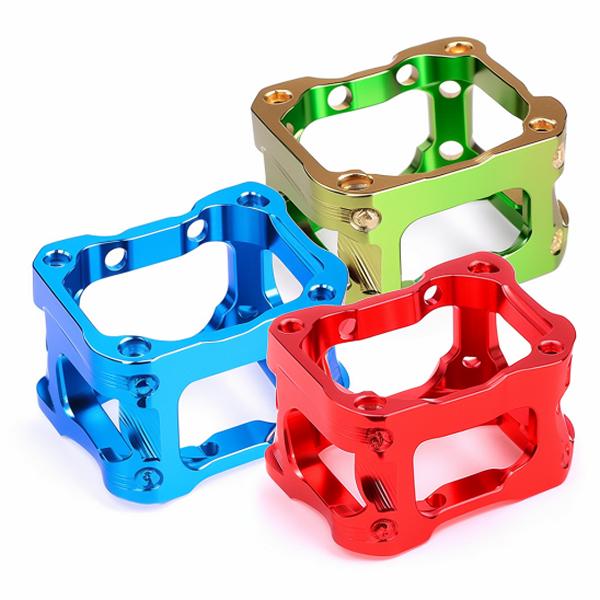The 6-Second Trick For Alcast Company
The 6-Second Trick For Alcast Company
Blog Article
Some Known Questions About Alcast Company.
Table of ContentsAlcast Company Can Be Fun For AnyoneThe 5-Minute Rule for Alcast CompanyThings about Alcast CompanyHow Alcast Company can Save You Time, Stress, and Money.Alcast Company - TruthsOur Alcast Company Diaries
Chemical Contrast of Cast Light weight aluminum Alloys Silicon advertises castability by reducing the alloy's melting temperature and boosting fluidity during spreading. Additionally, silicon contributes to the alloy's toughness and put on resistance, making it beneficial in applications where durability is crucial, such as automobile parts and engine elements.It also boosts the machinability of the alloy, making it simpler to refine right into ended up items. This way, iron adds to the general workability of light weight aluminum alloys. Copper increases electric conductivity, making it advantageous in electrical applications. It also improves corrosion resistance and includes in the alloy's general toughness.
Manganese contributes to the toughness of light weight aluminum alloys and boosts workability (Aluminum Casting). It is commonly used in functioned light weight aluminum items like sheets, extrusions, and profiles. The existence of manganese aids in the alloy's formability and resistance to breaking throughout construction processes. Magnesium is a light-weight component that offers toughness and effect resistance to aluminum alloys.
Alcast Company - The Facts
It allows the manufacturing of lightweight parts with superb mechanical residential or commercial properties. Zinc enhances the castability of aluminum alloys and helps regulate the solidification procedure during casting. It improves the alloy's strength and solidity. It is frequently found in applications where elaborate forms and fine information are necessary, such as decorative spreadings and particular automobile components.

The main thermal conductivity, tensile strength, return toughness, and prolongation differ. Amongst the above alloys, A356 has the highest possible thermal conductivity, and A380 and ADC12 have the least expensive.
Getting The Alcast Company To Work

In precision spreading, 6063 is fit for applications where complex geometries and high-grade surface coatings are extremely important. Examples include telecommunication rooms, where the alloy's superior formability enables streamlined and cosmetically pleasing styles while keeping structural integrity. In the Lighting Solutions industry, precision-cast 6063 elements develop elegant and effective illumination fixtures that need elaborate forms and good thermal performance.
The A360 displays remarkable prolongation, making it ideal for complicated and thin-walled parts. In accuracy casting applications, A360 is well-suited for markets such as Customer Electronic Devices, Telecommunication, and Power Tools.
The Best Guide To Alcast Company
Its one-of-a-kind properties make A360 a useful option for accuracy spreading in these markets, improving product toughness and high quality. Light weight aluminum alloy 380, or A380, is a commonly made use of spreading alloy with a number of unique features. It uses excellent castability, making it an optimal option for precision spreading. A380 displays great fluidity when molten, ensuring intricate and thorough molds are accurately reproduced.
In accuracy spreading, aluminum 413 beams in the Customer Electronics and Power Tools sectors. It's frequently utilized to craft detailed elements like smartphone real estates, video camera bodies, and power tool coverings. Its accuracy is remarkable, with tight tolerances approximately 0.01 mm, guaranteeing remarkable item setting up. This alloy's premium rust resistance makes it a superb option for exterior applications, ensuring resilient, durable items in the mentioned markets.
All About Alcast Company
As soon as you have made a decision that the aluminum die casting procedure is suitable for your job, a vital next step is determining on one of the most suitable alloy. The aluminum alloy you choose will significantly impact both the casting procedure and the buildings of the end product. Due to this, you must make your choice carefully and take an informed strategy.
Determining the most suitable light weight aluminum alloy for your application will certainly mean considering a large range of qualities. These comparative alloy attributes comply with the North American Pass Away Spreading Organization's guidelines, and we have actually divided them right into 2 categories. The initial classification addresses alloy qualities that affect the manufacturing procedure. The 2nd covers characteristics influencing the buildings of the final product.
How Alcast Company can Save You Time, Stress, and Money.
The alloy you choose for die casting directly impacts a number of elements of the casting procedure, like just how simple the alloy is to deal with and if it is vulnerable to casting issues. Hot cracking, additionally known as solidification breaking, is a typical die casting issue for light weight aluminum alloys that can cause interior or surface-level tears or splits.
Certain light weight aluminum alloys are a lot more prone to hot cracking than others, and your selection must consider this. Another usual defect located in the die casting of aluminum is die soldering, which is when the actors stays with the die wall surfaces and makes ejection hard. It can damage both the cast and the die, so you must try to find alloys with high anti-soldering residential properties.
Rust resistance, which is already a significant feature of light weight aluminum, can differ significantly from alloy to alloy Bonuses and is a necessary characteristic to consider depending on the ecological problems your product will certainly be subjected to (Foundry). Wear resistance is another building frequently looked for in aluminum items and can differentiate some alloys
Report this page